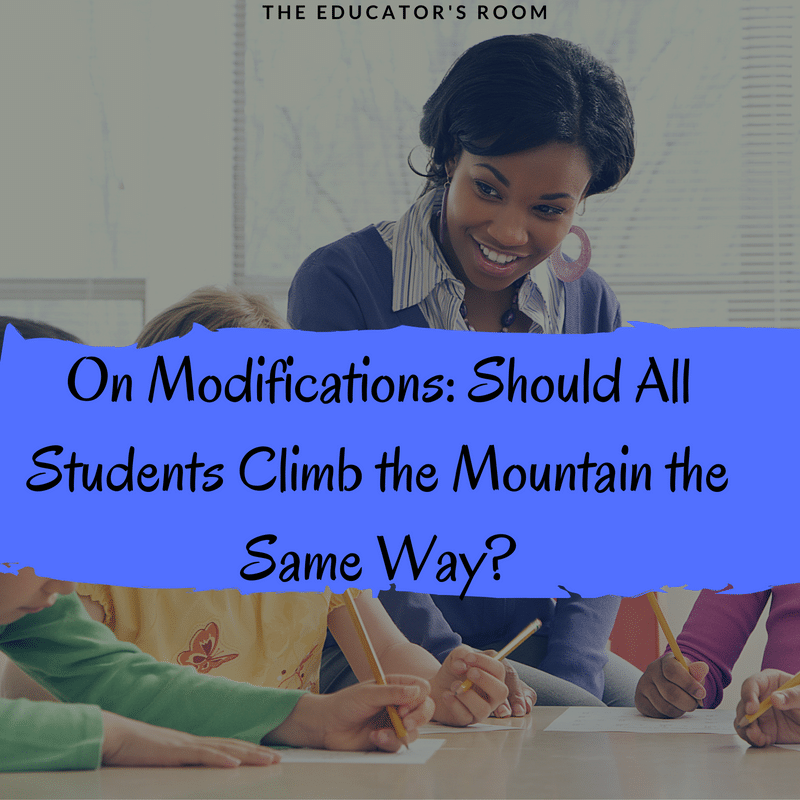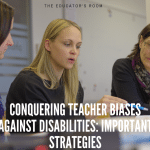As a former special education teacher, I remember hearing all of the time about how students needed to all do the same thing in the classroom because, at the end of the year, they would all take the same test. Despite the intellectual ability of the student, many teachers still argue that all students should be treated the same. Outcries about how “unfair” it is to provide students with accommodations and modified assignments ring through the air. But, should all students climb the same mountain? Further, should all use the same equipment to make it to the summit? In order to answer this question, teachers must understand why modifications and accommodations exist.
[bctt tweet=”But, should all students climb the same mountain?” username=”EducatorsRoom”]
The Old Adage: Fair Isn’t Always Equal
So, maybe you feel it’s not “fair” to have some students working on a lengthier or more robust assignment than others. If so, I want you to stop and consider what it feels like to be in the shoes of a student with a disability. Did you know that some websites allow you to take a glimpse of what it’s like to live with a disability? At understood.org, you can get a grade-level and disability-specific simulation of what it’s like in the classroom for your student. Why not try these simulations out and see how they make you feel?
[bctt tweet=”For a student with an intellectual disability, sometimes the mountain we expect all students to climb is simply too high and doesn’t have enough footholds.” username=”EducatorsRoom”]
Sometimes the mountain is too high
For a student with an intellectual disability, sometimes the mountain we expect all students to climb is simply too high and doesn’t have enough footholds. If you look at the brain science connected to learning, a shut-down occurs in the brain when we feel threatened. Stress and fear of failure are automatic shut-down mechanisms for students with disabilities. Can they achieve great things? Yes, of course. But perhaps we need to think about whether they need to go up the mountain a different way. Maybe they need a less steep trail or better equipment. We can get them up the mountain at their own pace in their own time. Conscientiously speaking, if a child feels that he/she is accomplishing great things, they will make progress. While we get penalized for students who don’t pass that statewide standardized test, we do get some points for growth.
Helping Students Make it to the Top
Maybe they need a less steep trail or better equipment. We can get them up the mountain at their own pace in their own time. Conscientiously speaking, if a child feels that he/she is accomplishing great things, they will make progress. While we get penalized for students who don’t pass that statewide standardized test, we do get some points for growth. A stressed out and broken down student does not grow. Unless you want to send out a rescue team to help the student come down the mountain, it’s best to just go the safer route.
[bctt tweet=”A stressed out and broken-down student does not grow” username=”EducatorsRoom”]
Modifications exist for a reason
Depending on the state or school district you work for, students with moderate to severe disabilities may come into your classroom. Expecting a student who cannot spell sight words to read Moby Dick is just unreasonable. You can provide an audio version of the book, but analyzing the book and answering higher-level thinking questions will still prove difficult without modifying the level of the questions and providing hints or pictures to prompt understanding. In no way does providing reasonable accommodations and modifications impair the student further. Rather, they allow us, as teachers, to ensure that we are testing them on the relevant subject-matter and not based on their reading ability.
[bctt tweet=”Should all students go up the mountain the same way? How #Modifications Help All Students find Success.” username=”EducatorsRoom”]
Why It’s Absolutely Fair to Make Changes for Students with Disabilities
Hopefully, as teachers, we all have empathic hearts and we’re out to do the best for all of our students. We’re not just teaching toward the middle of the class, but teaching to reach all kids. Sometimes that means some students need more help to get to the same place as other students. What’s more fair? Making a student who doesn’t have the working memory to hold a bunch of information in his mind compute numbers without a calculator while another student in the classroom can process the information within seconds, or leveling the playing field so that both students can compute at the same rate? While knowing basic math facts is important on some level, understanding the conceptual part of math is far more important.
If we truly want all students to find success in the classroom, we must acknowledge their needs and ensure that all students make it to the top of the mountain without suffering any casualties. Without getting into specific disabilities and the necessary accommodations, I just want to briefly mention that unless you have stood where that student is standing–with a learning disability, attention problems, intellectual disabilities, autism, traumatic brain injury, or whatever the student might have–you cannot judge how hard the student might be working to find success in the classroom. Most students do not want to fail. As teachers, our job is to prevent failure, not hold kids to impossible standards.
King of the Mountain
As kids, some of us played a game called King of the Mountain, where every child tried to occupy the highest point of a hill or platform. Only one child could occupy the top and that child was the king of the mountain. In the classroom, our goal is not to have one child occupy the top, but to get as many children there as we possibly can. Accommodations and modifications are designed not to act as a crutch for students or an unfair advantage, but rather to give them the chance they’d never have otherwise to reach for the highest point of academic success.
Think about that. Do you want one king of the mountain or do you want every child to have a chance to make it to the top?






